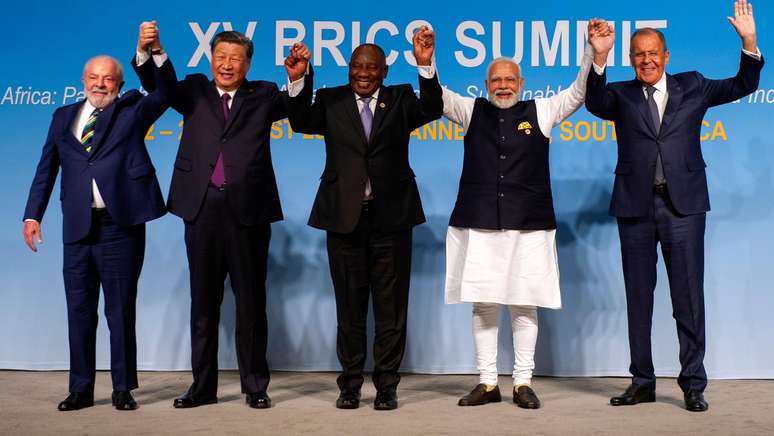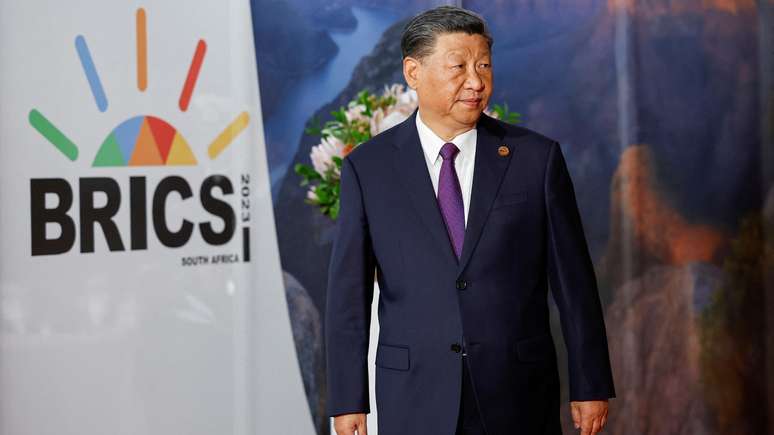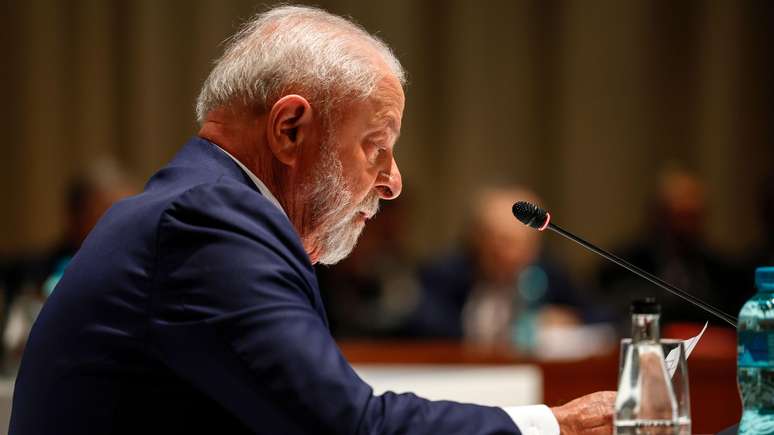In the midst of the Chinese movement that led to the announcement of the bloc’s expansion process, Lula and Fernando Haddad declared that the group is not an opposition to the West.
In the first two days of the 15th BRICS Summit, the Brazilian government demonstrated that it was trying to balance itself with the strength that China exerts on the group and that it feared that the bloc created in 2006 as an alternative to the current global order would be seen as a group which opposes him frontally.
This Thursday (08/24), the block expansion process was officially confirmed.
The president of South Africa, which hosted the bloc’s 15th summit, announced that Saudi Arabia, the United Arab Emirates, Argentina, Egypt, Iran and Ethiopia have been “invited” to join the group as full members since the 1st January 2024.
The term “invitation”, according to the diplomats, is a technical formality, since the countries announced had already shown interest in joining the bloc.
The BRICS are the group formed today by Brazil, Russia, India, China and South Africa. Initially, the bloc was united on the basis that they are countries with emerging economies located in the so-called global South, a term used to designate developing countries located in the southern hemisphere.
Since its creation, economic cooperation between countries has been the main topic discussed by its leaders. In 2014, the group created the New Development Bank (NDB), which became known as “Banco do Brics”, currently chaired by former president Dilma Rousseff (PT).
The bloc’s summit, which began on Tuesday (8/22), will conclude on Thursday. The meeting takes place in Johannesburg, South Africa.
Pressure from China
In recent years, pressure exerted by China, with support from Russia, to expand the group has raised questions as to whether this move was intended to give the bloc a more political character.
The doubts raised by analysts arise at a time when relations between China and Russia with the United States and the European Union are in crisis.
China is accused by the Americans of predatory business practices and espionage, which the Chinese government denies.
The Russians, on the other hand, face sanctions and international criticism over the war in Ukraine, which began in 2022 when troops commanded by President Vladimir Putin invaded the neighboring country.
In this scenario, both President Lula and Finance Minister Fernando Haddad have come forward responding to rumors that the BRICS have become antagonists to other groups, such as the G7, a group of the seven most developed countries in the world.
“We don’t want to be a counterpoint to the G7. We don’t want to be a counterpoint to the G20. We don’t want to be a counterpoint to the United States. We want to organize. We want to create something that never existed, that never existed,” Lula said, during a radio show on Tuesday (22/08).
In the same program Lula took up the subject again.
“BRIC does not mean taking anything away from anyone. It means an organization with a strong core, which brings together many people. If Indonesia joins, with over 200 million inhabitants, we will have more than half of the population (of the world) participating in this And this is important because it will allow us to have some balance in the discussions,” Lula said, referring to the possibility of Indonesia joining the bloc, which has not been confirmed.
Indonesia, indicated as one of the favorites to join the bloc, would join at a later stage, according to the assessment of some negotiators.
On the same day, Fernando Haddad followed the same line as Lula.
Speaking to ministers and businessmen gathered at a business forum during the BRICS summit, Haddad said the bloc should not be interpreted as an antagonist to other blocs.
“We believe that the Brics have a great contribution to make. Brazil, South Africa, India, China and Russia can, each from their own perspective, offer the world a vision that is coherent with their goals. And this does not mean antagonism with other important forums in which we participate,” said the minister.

In search of balance
Professor of International Relations at the State University of São Paulo (Unesp) and researcher at the International Relations Research Center of the University of São Paulo (Nupri-USP), Marília Souza Pimenta told BBC News Brasil that the meeting of this year can consolidate China’s leadership and geopolitical leadership of the group.
“This meeting could be decisive, as it could consolidate its expansion and, therefore, the absolute leadership of China in the Bloc, as well as the realization of the more geopolitical and ideological character of the Bloc,” the professor told BBC News Brasil, before l announcement that confirmed the expansion process.
Diplomats and members of the Brazilian government, interviewed privately by BBC News Brasil, argue that China is not making any concrete move to transform the BRICS into an opposition bloc to the so-called West.
However, they say that the fear that this interpretation could be spread led Lula and Haddad to speak openly about it.
They say that a BRICS bloc in opposition to powers like the United States or Western Europe is of no interest to Brazil.
According to them, although Brazil supports the strengthening of the BRICS and President Lula constantly criticizes institutions such as the UN and the G7, the country’s strategy would continue to be that of maintaining good relations with Europe and the United States.

According to them, this position would be in line with the country’s diplomatic tradition.
In recent years, one of Brazil’s partners in trying to contain Chinese leadership in the BRICS has been the Indian government.
The country has territorial disputes with China and is an important political and economic partner of the United States in Asia.
Initially, Brazil and India had shown resistance to expansion by the Russians and Chinese. In recent days, however, the Brazilian and Indian governments have begun to demonstrate that they would not veto the entry of new members.
Source: Terra
Rose James is a Gossipify movie and series reviewer known for her in-depth analysis and unique perspective on the latest releases. With a background in film studies, she provides engaging and informative reviews, and keeps readers up to date with industry trends and emerging talents.







